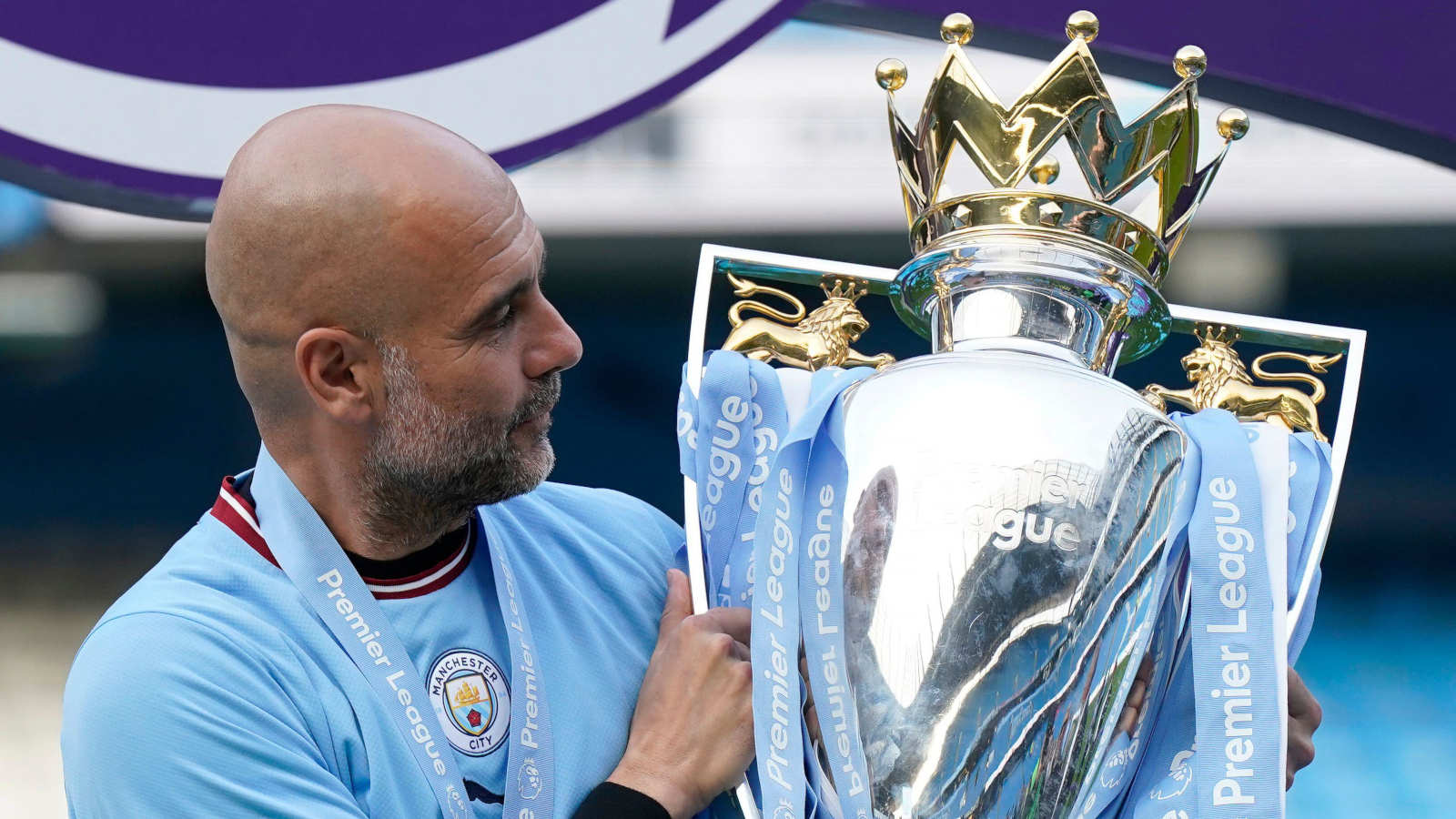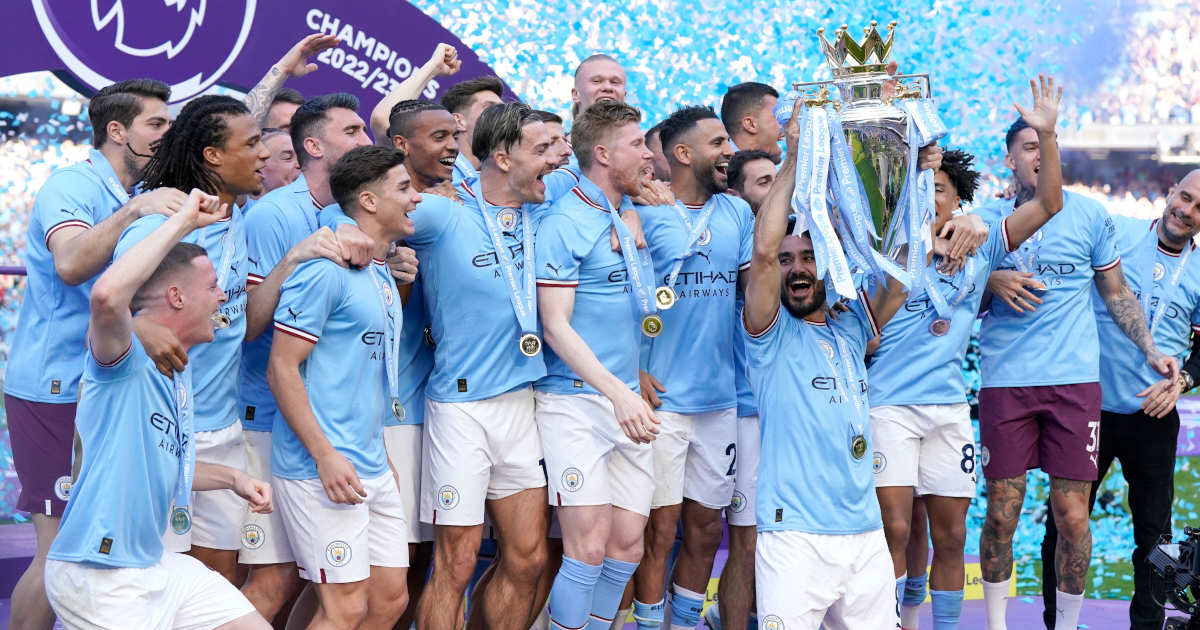Manchester City may be a juggernaut right now, but all things must pass

Manchester City may be in a period of dominance on the pitch right now, but this kind of spell always has a sell-by date.
So that’s that then for another year. There had been some degree of mild hope that the Premier League’s title race could be stretched into the final week of the season, but in the end Arsenal didn’t quite have enough to get close to the line while the Manchester City juggernaut just kept rolling along.
And with this Premier League title win comes a reopening of the conversation about exactly how they did it and the ethics of it all, everybody back in their internet bunkers, lobbing their verbal grenades at each other, opinions already both fully formed and perfectly rehearsed. The debate will continue forever.
And this will happen regardless of the outcome of the 115 charges brought against the club over breaches of FFP regulations and failing to co-operate with the Premier League’s investigation. In no way whatsoever does this ever feel as though it will be definitively resolved. Just like The Football itself. We all have our opinions on every single iota of detail, and the number of minds that will likely be changed – certainly among those of us who choose to share them online – will likely be vanishingly small.
With five out of the last six Premier League titles, Manchester City are on the cusp of being the most successful team in the entire history of the league but they’re not quite there yet. Liverpool won five league titles out of six between 1979 and 1984, winning the European Cup twice in that time. Manchester United did the same between 1996 and 2001, winning the Champions League once.
But should they win it again next season, becoming the first team to win four successive English titles and making it six out of seven in the process, it’ll feel pretty inarguable, especially should they claim the Champions League against Inter next month.
It should be perfectly obvious that football supporters will fall in along party lines on this subject. Liverpool supporters will argue that the First Division was considerably more egalitarian in the early 1980s, before commercial and television revenues opened up a huge gap between even the top flight’s haves and have-nots. Manchester United supporters would argue that the Champions League is considerably more difficult to win than the European Cup. Manchester City supporters would argue that they are about to join these two clubs, and with no end in sight.
It’s just as obvious that supporters of rival clubs will start to argue that monopolies are a great thing when they’re enjoying them, and that they’re a bad thing when they aren’t showing too many signs of having one now. But that cuts to the core of an argument which is far greater than any of this: what do we want football to be? How important is competitive balance? To what extent would we distort the natural flow of free-market capital if that flow starts to disrupt that balance?
Regardless of the rights and wrongs of how Manchester City arrived at such dominance over the rest of the Premier League, we are where we are and it’s likely no coincidence that these periods of domination have come at a time when money has increasingly come to dominate the narrative of the game.
For decades, rules and regulations kept the free market’s worst excesses to a minimum within the game itself, and this had an enormous effect on competition within leagues. Arsenal supporters may well argue that their period of dominance under Herbert Chapman with three successive league titles from 1930 to 1933 is worthy of inclusion as a top-tier period of dominance in English football history when you consider that this was the world into which they started that run, the 1929/30 First Division season having finished with four points between the bottom nine in the table. Winning the league title three years in a row in that world was an incredible achievement. Supporters of Huddersfield Town, who achieved the same treble under Chapman between 1923 and 1926, may nod their heads in agreement.
Slowly these regulations were chipped away as part of a broader shift in the post-war years. The maximum wage tied player wages to roughly double the average industrial worker’s wage until 1939, but this narrowed to about a third more after the war, when labour shortages pushed wages up and football’s maximum wage didn’t keep pace, and was abolished in 1961 under threat of strike action. Wages started to increase and transfer fees alongside them.
In 1983, the practice of sharing gate receipts for league matches ended and the introduction of live television broadcasting in the same year brought a new revenue stream that would change the game forever. That first live television contract was worth £2.6m a year for two years. Within a decade it was £60m a year over five years. It’s now worth £1.6bn a year. Running a football club became a millionaire’s game. Then it became a multi-millionaire’s game. It is currently somewhere between being a billionaire’s game and a nation-state’s game.
The Premier League is already fully aware of the importance of some degree of competitive balance. For the 2021/22 season, the highest earning club (Manchester City) earned 1.6 times the lowest (Norwich City). All 20 clubs receive an equal base payment from TV rights, which was worth about £84m last season, with clubs then earning additional amounts depending on how often they are selected for domestic TV, and it is relatively egalitarian. In Italy, the highest-earning club (Inter) made 3.2 times that made by Venezia, the lowest-earning Serie A club. In Spain, Real Madrid and Barcelona received 3.5 times the amount of the lowest-paid three clubs in La Liga.
But this hasn’t stopped Manchester City, just as it didn’t stop Manchester United before them, so if the Premier League don’t want the Premier League turning into Ligue Un, where are they going to set the bar? Financial Fair Play has become the battleground in recent years, with Manchester City supporters arguing that it was introduced to protect a small number of already-established clubs.
The Premier League already knows that this aura of competition – and many would argue that is only an aura, considering that the number of clubs who can realistically win the league has been diminishing for years – is one of the key factors why it left other European leagues behind in terms of television broadcasting revenues. Indeed, it might be considered that the charges against Manchester City are addressing this issue in the most head-on way possible.
City may seem unstoppable right now, but every other period of dominance in the history of football in England has come to an end at some point. Fans of rival clubs are already looking forward to the point at which Pep Guardiola leaves the club with a sense of expectation that this will offer other clubs an opportunity to catch up, as happened with Manchester United after the retirement of Alex Ferguson and the earlier departure of Matt Busby, or at Leeds after Don Revie.
There are reasons to be cautious of this viewpoint. After all, City will surely have their pick of the world’s best coaches to replace Guardiola, and those pockets remain as deep as ever.
But it is also worth recalling that Manchester United have been exceptionally badly run in recent years but will soon be coming under new (part?) ownership. We’ll never know how much Chelsea might have achieved, had Abramovich’s money been married to a fully-functional long-term strategy rather than a revolving door managerial policy, and we don’t know what it might achieve under Todd Boehly and Clearlake either, though early signs are not good. Neither they nor Liverpool will be as bad as they were for lengthy periods of 2022/23 again.
Newcastle are significantly improved, albeit under the ownership of another state-run outlet. Arsenal showed that it is possible to get within reach of the title from outside the top four. There are reasons to believe that this period of City domination could be an exception rather than the norm.
Until some form of substantive regulatory change comes, the onus can only really be on these clubs – and others besides – to find a way of stopping that juggernaut on the pitch. Financial inequality existed within English football long before Sheikh Mansour or even Roman Abramovich arrived on the scene.
And that all raises one further question for supporters of City’s rivals over what follows this period of dominance: do you just want to dominate the league yourselves, or do you want something approaching a genuinely level playing field for all clubs?
READ MORE: Manchester City are best of all time and nobody gives a f***; take note, Premier League
